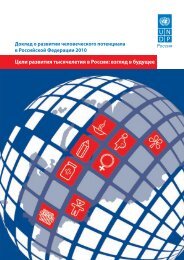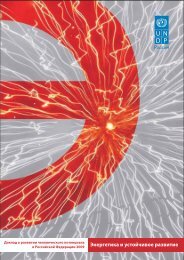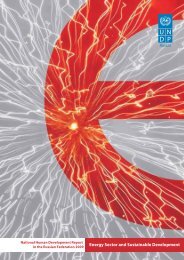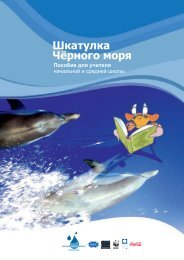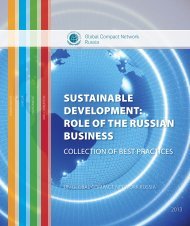practices in <strong>Russia</strong>'s housing utilities sector,which are usually attributed to harsh climaticconditions.If the energy concern index in <strong>Russia</strong> is5.5-8 times lower than that of our Nordicneighbors, it is unsurprising that unit heat use forheating residential buildings in <strong>Russia</strong> (500–600kWh/m 2 per year) is several times higher than inSweden or Finland (135 kWh/m 2 per year), whereclimatic conditions are similar to the average in<strong>Russia</strong> (averaging is carried out with adjustmentfor population density, and not simply over thecountry’s territory). Table 7.8 shows heatinsulation of all premises (not only housing), asgross output of heat insulation corresponds topopulation size, rather than to floor area ofparticular premises. Severe climate is often citedto excuse higher energy costs in <strong>Russia</strong>. <strong>Russia</strong> isa northern country and much heating will berequired, even with the best possible housingutility system. But the issue is the extent, to whichhigher energy consumption is due to climate,and the extent, to which it is due to other, quiteunrelated circumstances. Estimates have shownthat the climate factor can only be used to justify25% excess of energy intensity in <strong>Russia</strong>n GDPcompared with western Europe (even if the needfor air conditioning is left out) 20 .Energy intensity of <strong>Russia</strong>n GDP at thestart of the 21 st century was 3.1 times higherthan in the European Union (prior to theadmission of new members, i.e. with 15member countries). Maintenance of a relativelyacceptable economic situation in the countrywas only possible thanks to large-scale exportof oil and natural gas at relatively high prices.This makes the <strong>Russia</strong>n economy extremelyunstable and over-dependent on the state ofglobal fuel markets. These discrepancies havebecome apparent since the 2008 globalfinancial and economic crisis. <strong>Russia</strong>n productscannot be competitive in the world marketwhen their manufacture is so energy intensive.Only industries making semi-products fromdomestic raw materials (low-level metallurgy,mineral fertilizers, timber) can keep afloatthanks to disproportions between global anddomestic energy prices. These factors cast ashadow on the long-term outlook. Long-termeconomic problems could only be addressedby efficient deployment of resources obtainedin years when the market environment washighly favorable. But trends in energy intensityof GDP in 2000–2007 show that the potential isnot being used adequately. Some reduction ofthe energy intensity index since 2000 isinsufficient and much less than observed in theWest after 1974.These points are, essentially, platitudes,and are cited here to emphasize that <strong>Russia</strong>’slong-term economic interests by no meansconflict with its environmental interests: bothnecessitate reducing the power intensity of GDPthrough energy saving and increased energyefficiency. The modernization needed for energysaving would simultaneously yield considerableeconomic benefits, because new equipment isnot just more energy efficient, but moreeconomical overall and more reliable, enablingmanufacture of better-quality products in betterconditions of work, where staff can make fulleruse of their professional skills. The latter aspect isparticularly important, since current productiontechnologies in <strong>Russia</strong> often fail to match theeducational attainment level of industrialemployees, entailing inefficient use of laborresources and negative social consequences.7.9. Social and economicconsequences of hypertrophicdevelopment of the fuel& energy sectorAs shown in previous chapters,development of fuel & energy without regard forenvironmental concerns will have seriousnegative impact on the environment. If existing20The United States spend more power for air conditioning than <strong>Russia</strong> for heating. This is partly due to the climate but partly is a result of thepower wasting attitude. It is worth noting that Table 8 takes into consideration only the ‘harshness’ of the climate, but other aspects of a climatecan also be unfavorable . Other negative climate aspects are also found in <strong>Russia</strong>, but they are less vivid and systematic in inhabited areas.132 National Human Development <strong>Report</strong> in the <strong>Russia</strong>n Federation 2009
trends continued the damage would approachcatastrophic levels. However, full significance ofthese consequences can only be grasped inconjunction with other processes, initiated,supported and intensified by hypertrophicdevelopment of the fuel & energy sector. We listall of the relevant factors (Box 7.1) without goinginto detail (such detail can be found in previouschapters of this <strong>Report</strong> and in other publications:[Danilov-Danilyan, 2001, 2003], etc.) 21 .It is easy to see that the points listed inBox 7.1 are interlinked. The first five refer mainlyto negative economic consequences ofhypertrophic development of the raw materialssector, while the other four emphasize socialconsequences of this process. The trends, whichhave been described, can undermine humandevelopment, creative social practices, and thestrengthening of civil society.7.10. Energy and environmentalmalaise and ways of overcoming itThe current state of <strong>Russia</strong>n energyproduction, characterized by unacceptably highand increasing adverse impacts of the fuel &energy industry on the environment andsquandering of energy in the economy, could bequalified as ‘energy and environmental malaise’.We have described how this situation has comeabout, but a few more important aspects areworth pointing out.The ‘big money’ to be made from oildiscourages the development of long-rangeinterests among business groups, particularlythose dealing directly with oil. Their focus onmaximum gains while market conditions arehighly favorable is understandable: they wouldhave to make much greater efforts in order toobtain many times smaller profits if world fuelprices were lower, so it is important to seize theopportunity while it is there. But this approachentails disregard for environmental protection,sustainable use of mineral resources,technological innovation, and energy andresource saving. There was no time or need forsuch details in the mid–2000s environment ofsuper-profits from record oil prices (even a priceof about USD 70 dollars per barrel triggersdisregard for nature conservation, which dropsout of account completely at higher price levels).Individual and clannish interests of oil magnatesdiverge radically from national interests. Andartificially low domestic energy prices, which,essentially, result from exorbitant world prices,undermine progress to energy saving in powerconsumingindustries.State regulation of oil production (and ofmineral resource use in general) is inefficient:licensing commitments have token status andare not properly enforced; tax issues have beenleft unresolved; distribution of resource rent doesnot meet long-term national interests or theinterests of the fuel & energy sector itself; and asearch for ‘direct’ methods of rent expropriationlead to economic deadlock (see [Danilov-Danilyan, 2004]) 22 ; the government is notimplementing any amortization policy, but haswashed its hands of the major challenges ofcapital repair and renovation (unlike the situationin developed countries, where these issues aregiven equal priority with tax collection).It is hard to expect resolution ofenvironmental problems if the government has noenvironmental policy: since abolition in 2000 of the<strong>Russia</strong>n State Committee for EnvironmentalProtection (Goskomgeologiya), there have beenalmost no attempts to define and start consistentimplementation of such a policy. Approval by thegovernment in 2002 of the <strong>Russia</strong>n EnvironmentalDoctrine has had no practical consequences andno other documents related to environmentalpolicy have been issued since 2000. The economic21E.g. see: V.I.Danilov-Danilyan, The Run for the Market: 10 Years Later, M., MNEPU, 2001, 232p.; V.I.Danilov-Danilyan, Power Efficiency-theKey Route of <strong>Russia</strong>’s Economic Development // Economic Issues of Environmental management on the Fringe of the XXI-st Century, M., TEIS,2003, pp.580-593.22See: V.I.Danilov-Danilyan, The Natural Resource Rent and Utilization of Natural resources // Economics and Mathematic Methods, 2004,vol.40, No.3, pp.3-15.133
- Page 1 and 2:
National Human Development Reportin
- Page 3 and 4:
National Human Development Reportin
- Page 5 and 6:
ACKNOWLEDGEMENTSThe authors express
- Page 7 and 8:
Dear Reader,You have before you the
- Page 9 and 10:
PREFACEThis is the 13 th National H
- Page 11 and 12:
country’s fuel & energy regions r
- Page 13 and 14:
environmental degradation and enhan
- Page 15 and 16:
Chapter 1The Energy Sector,the Econ
- Page 17 and 18:
By 2008 Russia had increased its sh
- Page 19 and 20:
the share of energy in the national
- Page 21 and 22:
exported, increased. However, this
- Page 23 and 24:
elimination of structural and terri
- Page 25 and 26:
• Establishment of competitive me
- Page 27 and 28:
number of developed countries, incl
- Page 29 and 30:
Although the United Nations Climate
- Page 31 and 32:
industrial region of the Urals - Sv
- Page 33 and 34:
2.2. Budget capacityand structure o
- Page 35 and 36:
(the Federal State Statistics Servi
- Page 37 and 38:
Immigration by young and highly ski
- Page 39 and 40:
energy regions exacerbate the incom
- Page 41 and 42:
Khanty-Mansi and Yamal-Nenets Auton
- Page 43 and 44:
the Ministry for Regional Developme
- Page 45 and 46:
various other long-term problems in
- Page 47 and 48:
is also associated with the fuel an
- Page 49 and 50:
Republic of Mordovia 8051 0.732 68.
- Page 51 and 52:
Legislative control of impact audit
- Page 53 and 54:
Chapter 3Personal Incomes, the Ener
- Page 55 and 56:
than any other sources of income -
- Page 57 and 58:
Are wages now the main instrument f
- Page 59 and 60:
comparison of month-on-month develo
- Page 61 and 62:
• The unemployed, people who aree
- Page 63 and 64:
Employment in the energy sector acc
- Page 65 and 66:
The share of household expenditures
- Page 67 and 68:
subsidization practices in the regi
- Page 69 and 70:
in power use between regions now de
- Page 71 and 72:
Electricity prices for households h
- Page 73 and 74:
• Steady decrease in the percenta
- Page 75 and 76:
1. The number of graduates with eng
- Page 77 and 78:
As well as requiring better fuelcom
- Page 79 and 80:
Box 4.1. The village of Kolvain Uss
- Page 81 and 82:
continue to use solid fuel for a lo
- Page 83 and 84: Box 4.3. Ambient air pollution andp
- Page 85 and 86: either by large power generating fa
- Page 87 and 88: Box 4.6. A city at riskNovocherkass
- Page 89 and 90: In order to assess impact of thesee
- Page 91 and 92: generation facilities through safer
- Page 93 and 94: achieved in developed countries. So
- Page 95 and 96: equires 2-6 times more capital inve
- Page 97 and 98: government) should set targets and
- Page 99 and 100: networks. In 2007 government budget
- Page 101 and 102: enhancement is also important. Ener
- Page 103 and 104: energy efficiency of the transport
- Page 105 and 106: Box 5.1. Programme of the Ministry
- Page 107 and 108: educational and informational suppo
- Page 109 and 110: mechanism for using national quota
- Page 111 and 112: Figure 6.2Share of electricity gene
- Page 113 and 114: One of the major benefits of renewa
- Page 115 and 116: odies; outdoor air; rocks and soil;
- Page 117 and 118: Design and construction of geotherm
- Page 119 and 120: Box 6.3. Prospects for nuclear powe
- Page 121 and 122: consists of out-dated equipment at
- Page 123 and 124: ConclusionThe world’s nuclear pow
- Page 125 and 126: 7.1. Impact of the fuel& energy sec
- Page 127 and 128: Table 7.5Solid waste from productio
- Page 129 and 130: Table 7.7Areas of disturbed and rec
- Page 131 and 132: nature of the impact (atmospheric e
- Page 133: Further, the economic cost ofenviro
- Page 137 and 138: What the government needs to do ino
- Page 139 and 140: Figure 7.2.1Specific atmospheric em
- Page 141 and 142: money value of industrial output) c
- Page 143 and 144: Figure 7.2.4Trends in specific atmo
- Page 145 and 146: Chapter 8The Energy Industry and Su
- Page 147 and 148: eing equal) it only reflects that p
- Page 149 and 150: (MDGs), issued by the UN in 2000. T
- Page 151 and 152: 8.4. The energy factorin integral i
- Page 153 and 154: Canada, the USA and Great Britain h
- Page 155 and 156: Box 8.2. Energy efficiencyindicator
- Page 157 and 158: Box 8.4. Energy efficiency rating o
- Page 159 and 160: 41 Penza Region 116.0 -35.2 -4.542
- Page 161 and 162: Appendix to Chapter 1Table 1.1. GDP
- Page 163 and 164: Attachment to Chapter 4Table 4.1Rus
- Page 165 and 166: Attachment to Chapter 4Volga Federa
- Page 167 and 168: Attachment to Chapter 4Belovo Belov
- Page 169 and 170: The previous National Human Develop



